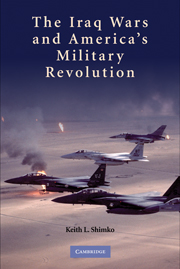Book contents
- Frontmatter
- Contents
- Acknowledgments
- 1 Military Revolutions and the Iraq Wars
- 2 From Vietnam to Iraq – The Rebirth of American Military Power and the Origins of an RMA
- 3 The First Iraq War, 1991 – A Revolution Dawns?
- 4 The Iraqi Interregnum, 1991–2000
- 5 Afghanistan and the Second Iraq War, 2001–2003 – A Revolution Confirmed?
- 6 The Third Iraq War, 2003–? – A Revolution Denied?
- Conclusion: The Future of America's Military Revolution
- Index
- References
5 - Afghanistan and the Second Iraq War, 2001–2003 – A Revolution Confirmed?
Published online by Cambridge University Press: 05 June 2012
- Frontmatter
- Contents
- Acknowledgments
- 1 Military Revolutions and the Iraq Wars
- 2 From Vietnam to Iraq – The Rebirth of American Military Power and the Origins of an RMA
- 3 The First Iraq War, 1991 – A Revolution Dawns?
- 4 The Iraqi Interregnum, 1991–2000
- 5 Afghanistan and the Second Iraq War, 2001–2003 – A Revolution Confirmed?
- 6 The Third Iraq War, 2003–? – A Revolution Denied?
- Conclusion: The Future of America's Military Revolution
- Index
- References
Summary
Bush, Rumsfeld, and Military Transformation
When his campaign for the presidency began, George W. Bush's foreign and defense policy views were something of mystery. There was little indication that he had devoted much thought to international issues of the day, and as a two-term governor of Texas, there was no need for him to do so. To be taken seriously as a future commander-in-chief, however, he could not remain a blank slate, especially since Senator John McCain was expected to be his chief rival for the Republican nomination. Given McCain's distinguished military career and nearly two decades in the Senate, he was sure to paint Bush as a foreign and defense policy neophyte, although whether this line of attack would carry much weight in the relatively serene international environment of the late 1990s was unclear. But Bush did not wait long to stake out his position, using a speech at the Citadel military academy in September 1999 to provide the first indications of his vision for American foreign and defense policy.
Bush's speech began unremarkably, consisting largely of widely voiced conservative criticisms of the Clinton era. Bush promised to “renew the bond of trust between the American President and the American military,” suggesting, of course, that the antimilitary and borderline draft-dodging Clinton had severed the bond. Claiming that “not since the years before Pearl Harbor has our investment in national defense been so low as a percentage of GNP,” he pledged to reverse the decline in defense spending begun by his father and continued under Clinton.
- Type
- Chapter
- Information
- The Iraq Wars and America's Military Revolution , pp. 131 - 172Publisher: Cambridge University PressPrint publication year: 2010

